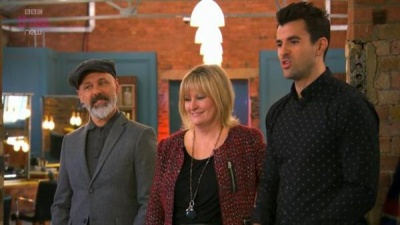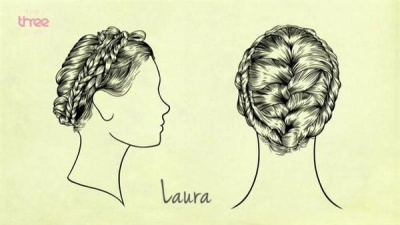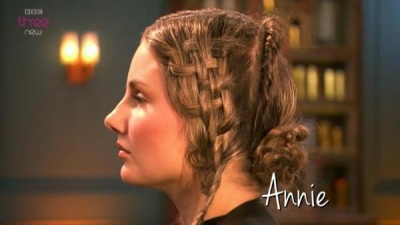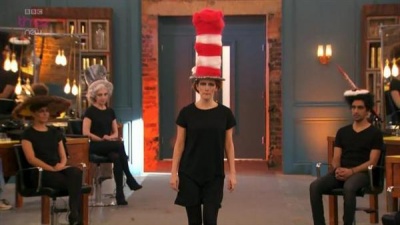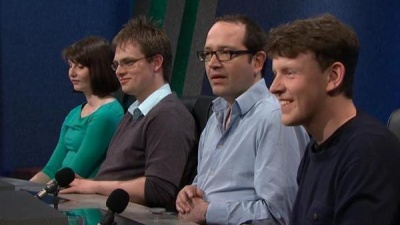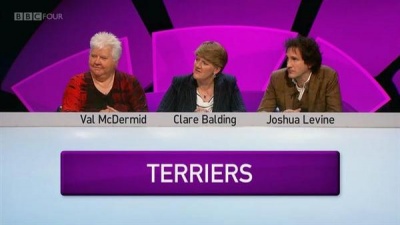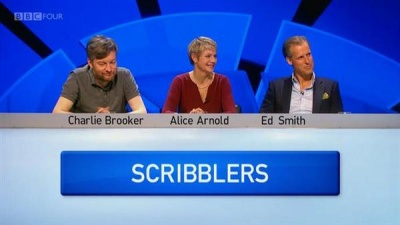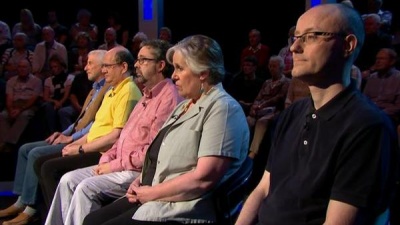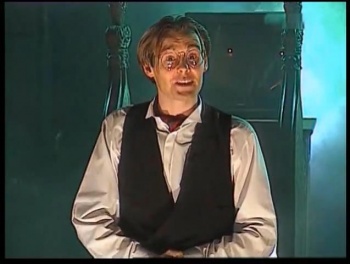Weaver's Week 2014-03-23
Last Week | Weaver's Week Index | Next Week
Coming up next week, an exclusive review of a new show. You don't want to miss it.
Two dispatches from the War of Generations, as we review BBC3's Hair and try to make sense of OFCOM's latest broadside against Big Brother. Also: the tenth and final University Challenge quarter-final, Only Connect makes a brief comeback, and Mastermind deigns to delight us again.
Contents |
Hair
BBC3, from 25 February
It's difficult to review "Hair" without comparing it to Great British Hairdresser. That went out on E4 in early 2011, and was a bit of a disaster. The show was misnamed, seeking a fashion hairstylist to work under extreme time pressure and not an actual hairdresser. The programme was shot through with the snobbish superiority of the fashion police. We have other descriptions, none of which we care to use on a Sunday morning. The final nail in the show's coffin came when judge James Brown (no, the hairdresser) went off on a highly-publicised rant against Natalie Portman and other people were subjected to the n-word and the m-word. There can only be one winner in any battle between real talent and fake flummery, and Ms Portman is still making movies.
So, what of the BBC programme? For starters, it's a competition on its own merits. The prize isn't a photo-shoot for Waif magazine, it's recognition as the best young amateur hairdresser in the UK. And it's got a decent host, Steve Jones (2). OK, the bloke from 101 Ways to Leave a Gameshow (sic) and Drop Zone hasn't always made good choices, but he's solid, reliable, and capable of improvising sentences in a way that GBH commentator Clancey Abbey wasn't.
Prior to seeing the show, we didn't know who the judges on Hair were. According to the blurb, Denise McAdam is a hairdresser to the Windsors of Windsor. Alain Pichon cuts the hair of someone almost as royal, David Beckham. We still don't know who they are, we recognise them as "the northern one" and "the bloke wearing a silly hat", but they clearly know what they're talking about, and they're clearly working for the good of the contestants. They're not around solely to get the starch of some television into their insubstantial and vapid careers.
The contestants are pretty much what we'd expect from a BBC3 programme. So we've the fake tan, the exotic foreigner, the fifties throwback, the exceedingly camp one, and the young black man from a tower block. Not only did he confound expectations of people who expect young black men to have a gun under his woolly hat, but it was very clear he was there on merit.
There are three challenges on each show, with a slightly inevitable elimination at the end of the hour. The first challenge is to incorporate a particular technical element, such as a 7cm quiff, or a braid. It'll test the skills of the young stylists, it'll also ensure they're able to use some artistry. Challenge two is done on "blockheads" – no, not the BBC Trust, but the head and shoulders of a dummy. This is a purely technical test, and the competitors are ranked in order.
Once both of these tests are under way, Steve Jones sits down with the judges, and asks them to explain what they're looking out for. He plays the part of the naif, the person who knows a short-back-and-sides and very little else. What makes a good quiff? How can you get a spectacular mohawk? Denise and Alain sit down and patiently explain to Steve, and through him to the viewers. This is the other big difference from Great British Hairdresser: on Hair, they take time to explain what it is they're doing, and to set out the judging criteria beforehand. We come away from the challenges knowing not only that people have succeeded and failed, but what they've done so.
The best blockhead gets first choice of human model in the creative round, second-best gets second choice, and so on until the last person is lumbered. The final challenge is three hours to complete a whole new look, incorporating some set elements. Here's where the show gets seriously fun, with props and everything. This gets almost half the show, and includes about fifteen minutes of frantic hairdressing and prop-making against the clock.
The opening "fairytale" challenge led to someone making a doll's garden on a head; the subsequent "hats incorporating hair" challenge had the Game Show Hat panel watching with open mouths. How on earth do they do that?! Throughout, there's a little discussion of how the styles are being created – it's not enough for the casual viewer to replicate what they're seeing, but it is enough for them to understand what's going on.
And that's the show. Good-natured, entertaining, celebrating the good works of young people. What could BBC management have against Hair? Is it that they're all bald? Or could it be that Tony Hall doesn't want this to eclipse the fond memories of his favourite flop from 2011, Don't Scare the Hare?
Memorandum from the Ministry of Truth
Broadcasting pressure group OFCOM issued a report against Big Brother this week. The organisation accused Channel 5 of being offensive when it showed footage of a row between lab rats Daley and Hazel last year. The row, which included Daley placing his hands around Hazel's neck, led to his removal from the television programme. This column saw the broadcast in question, but not earlier ones which Channel 5 used in its response.
From this sofa, we reckon that the Big Brother producers had convinced themselves that Hazel was flirting with Daley and was into rough sex, and that there was an element of acting in their late-night row. We might surmise that the producers had dubbed Hazel as 2013's first-month scapegoat, to be humiliated until she broke, but we can't back this with hard evidence. What seems clear is that at 1.20 in the morning, the production staff didn't want to throw Daley out until they'd had a chance to think about things, in particular to actually hear Hazel's side of the event. In the confusion, they were less forceful than some campaigners would like.
The result was a near-impossible choice. The Big Brother producers could lie to their audience, concealing vital facts that might alter the show's outcome, vital facts that would certainly make Daley's subsequent removal appear incomprehensible. The producers had done that before: by concealing Coolio's transphobic bullying of Nadia Almada, they made Coolio's exit appear entirely random, and sparked a further complaint by Nadia. But if they were going to be honest with the audience, they risked offending the easily offendable.
Big Brother producers chose to respect their audience. It's directly resulted in an adverse report from OFCOM. Regrettably, OFCOM is not some busybody, a Mary Whitehouse figure on a mission to "clean up" television. OFCOM is a government organisation that is supposed to ensure freedom of speech and a plurality of voices. Over the past few years, OFCOM has granted itself new powers, has unilaterally decided to push back the frontiers of the watershed, has presided over a catastrophic radio policy, and has allowed technically poor television signals to become the norm.
In this column's opinion, the Big Brother producers took sufficient steps to lessen the very harsh scenes. They were shown once, without special effects, and not repeated at all. In particular, they chose to devote ten minutes to a fact-finding exercise, letting the viewer see that this had affected Hazel, perhaps letting the producers realise that this had affected Hazel. Lab rat does bad thing, lab rat is taken from the immediate situation, the gravity of lab rat's crimes sink in, lab rat is removed from the studio. Even knowing the result, it was a tense piece of television.
The fact is that this column was not seriously offended by the episode of Big Brother. We were saddened, we were disheartened, we reckoned that Daley got his just desserts, but we were not really offended. This column does not agree with OFCOM's unsubstantiated assertion that the producers' initial response to Daley "did not reflect sufficiently the seriousness of the situation". In fact, we are more offended by OFCOM's decision to limit Channel 5's freedom of expression than by anything in the broadcast. It's an arbitrary exercise of unaccountable power, and we're not letting it pass without remark.
Was this show capable of causing offence? Viewed in isolation, or seen by someone who wanted to be offended, yes. Did it? Not in our view. This cuts to the heart of OFCOM's position. It claims to uphold "generally accepted standards", but this column does not accept these standards. We may well be out of step, OFCOM may well be detached from the general public, both of the above may be true.
We reckon this ruling is symptomatic of a bigger problem. We get the feeling that a generation gap is opening up, between aging fuddy-duddies who hold the political power, and younger people who actually make television. Big Brother is going to be a lightning rod for inter-generational disputes: it's a show seen and understood by young people, and neither seen nor understood by old folk.
We see the generational gap in OFCOM's decision. We see it in BBC management's proposal to replace BBC3 with BBC1+1. We see this in acts by governments, aware that pensioners vote and young people do not engage with traditional politicians. And we don't have an answer: yet again, game shows reflect society, they do not shape it.
University Challenge
Group Phase 4, Match J: SOAS v Queen's Belfast
SOAS beat Manchester and lost to Trinity Cambridge, Queen's Belfast lost to Southampton and beat Clare Cambridge. On the very first question, Queen's suggest that Al*st**r C*mpb*ll and Malcolm Tucker are the same person, a statement our host suggests might be libellous. Surely that would require Mr. Tucker to be a real person? Queen's get a set of bonuses on Chancellors of the Exchequer. A hidden transmission indicator in Budget week? Hardly, these questions could have gone out in any group phase match. We are surprised that Sharon and Ozzy's black sheep son didn't increase the tax on smug quiz hosts, there's a goldmine to be had. At the first visual round, SOAS has a slender lead, 35-30.
For one set of bonuses, Queen's are asked to name various German army leaders. After two completely wrong answers, the host cottons on to the cunning plan. "You're just making these up, aren't you?" And why not: saying "pass" is certain to score nothing, but there's a faint chance that "Dr. Otto von Scrachundsniv" could possibly be right. Classical music about the sea sees SOAS to a 90-50 lead. "Your bonuses are on sets of four" introduces a later slew of questions. Which reminds us, nine minutes until Charlie Brooker and the Arnolds on BBC4.
Puppets from Spitting Image form the second visual round, and – somewhat to the host's surprise – that gives Queen's the lead, 115-110. The lead lasts less than one question: SOAS interrupts for the next starter, and then spends a very long time getting two bonuses. From the seven sets of bonuses, SOAS has had precisely two right every single time. Queen's retake the lead on the flag of Hungary and words formed from "whimsical", and then they push further ahead with the SALT talks and the sums of infinite series. Popes Pius give SOAS a starter, from which they get — just the one bonus!
But then Peter McKean gets a starter on Hadrian's Wall, and that puts Queen's on the back foot. A full house of bonuses restores SOAS's record, and the show ends on a down note, with a missignal on each side. SOAS's final winning score is 165-145.
Only Connect
Sport Relief special
We heard this week how Only Connect was originally going to be a sports quiz with a different title. We can hear the continuity announcer clearing his throat now. "And now a trip to the world of sport. It's another bout of Four Play, with Victoria Coren Mitchell."
"A thorough dope test," is what we're promised this week. The Scribblers are Charlie Brooker (You Have Been Watching), Ed Smith (England cricketer), and Alice Arnold (defeated Only Connect captain). On the other side, Val McDermid (Wire in the Blood author), Joshua Levine (historical writer), and Clare Balding (victorious Only Connect captain) are the Terriers. Charlie warns that we're all going to die, Clare says that quizzing is a sport, because it helps if you're not drunk.
What's in Victoria's sports bottle? Round one: connections. The Terriers start, with £10 in Monopoly, 18 points in Formula 1, and they're having a good thought. Blue Crufts rosette. C'mon, Balding, where were you last weekend? "It's the Reserve Best in Show", she reminds us, almost as bad as The Krypton Factor Us and its "fourth-place winner". On to the Scribbers: surviving in a spiked barrel, stopping a fit by touching, weighing less than a Bible, floating in water. "Magical – things – Houdini did?" splutters Charlie. Not quite: tests for a witch, a bonus to the Terriers, who lead 2-0.
Music for the Terriers: Peter and the Wolf, Babushka, My Grandfather's Clock, but the link is not fairytales. "There's no-one quite like grandma" is the final clue, the Scribblers get the grandparent link after some nudging. Pictures for the Scribblers: West Ham supporters, Bubbles DeVere, the Bubbles painting, enough! 3-2.
Back to the Terriers: Howard's End, Veterans' Day, Caesar's Palace Las Vegas, Every dog has it's day. Really? The Terriers have published authors, but the Scribblers spot the apostophe's shouldn't be ther'e. On their own question: King Oliver, Winston Churchill Duke of London, Polly Toynbee CBE, and Charlie reckons it's people who declined honours: "Oliver" is Mr. Cromwell. The Terriers have this set, 6-2.
Sequences time, and the Terriers get a wish of "good luck". Red apple is 700, Peach is 500, and Strawberry is 300. Can they connect the dots to find the right answer? "Banana is 100". No. Ask the video games writer, Charlie Brooker: Cherries is 100, it's fruit in Pac-Man by value. On their own question, the Scribblers get to own a shotgun, buy a lottery ticket, and drive a car on the road. Get married is an interesting answer that Victoria takes; purchase alcohol the model answer, see an 18 movie the giveaway answer. 9-2.
"It's almost like a powder." "Ground mass is very fine." "I'm going to step off the LM now." The Terriers are out of this world. "That's one small step for man.." is right from Val: Neil Armstrong's words on the moon, and a fine two points. Back to the Scribblers, who have Origin, Departure, Relating to the Levites, and now have to work out where the book of Numbers got its name from. Books of the Bible, and the lead's trimmed to 9-5.
The Terriers are doing well, but then run up against: Cricket, golf foursomes, English billiards. Is there a sport involving eight individual players? Or something with four balls? Croquet? "I don't know, I'm not posh" says Val. Yeah, that'll do: Quidditch was the model answer, somehow two points there. "Oh, I love this question" says Victoria of the picture round. Someone being ill without K, a white van, Gloria Hunniford. Time expires, Val claims to have got this after one clue: it's Monday, as in "sic transit gloria mundi".
9-8 is the Scribblers' lead as they play wall 413. It doesn't detain them long: four massive sci-fi film series come out in no time at all, and then Alice shows her knowledge of 80s alternative bands beginning with "New". (OK, the Seekers aren't alternative, except against the Model Army.) Their third jab closes out the wall: editions of Trivial Pursuit, and roles played by Stephen Fry. Ten points!
The Terriers are less good at this, as they cycle through five possible navy ships. And through five possible David Bowie albums. Pass the chocolates, this is going to be a long round. JM Barrie is the final set they spot, but the team don't recall that Quality Street (the chocolate) took its name from the Peter Pan man's work. With two lives and about ten seconds to spare, the final groups are sorted out. Phew, that was a close one. Ten points!
Which means the Scribblers lead by 19-18 going into the final round. Buried at Pére Lachaise cemetery is the first group, on which the Terriers score a couple. Agatha Christie works also fall into their sphere, winning 3-(-1). Similes that contain food goes to the Terriers as well, 2-0.
"Flat as a pancake". The final answer that no-one got. Which means the Scribblers have 18, the Terriers have stormed ahead to 25. Donations are open at http://www.bbc.co.uk/sportrelief.
Mastermind
Second phase, match 3
- Ron Wood (Tutankhamun) suffered from long pronunciations of difficult names, and the host discussing alternative answers, to reach 10 (0).
- When Roderick Cromar (Life and Career of Clement Attlee) won his heat, we said he could be dangerous if he had a little more luck on his specialist round. Didn't happen this time: 6 (0) wasn't the round he wanted.
- Richard Chaney (James Herriot) managed to confuse his winter drawers and summer drawers, but then Herriot wrote about a world where people culd afford to change their furniture with the seasons. 5 (3).
- Chloë Stone (English history 1399-1485) has given herself a massive subject. Seriously, this is huge. It concentrates on kings and battles, including a famous engagement at Agincourt, and closes on a healthy 9 (2).
- Rae Donaldson (Life and Works of Joseph Cornell), an artist. Active during the 1940s in New York, Cornell worked with found objects and other detritus of life. Sounds like someone we could be interested in. The contender shoots back to his seat after picking a Perfect Round: 11 (0).
Richard Chaney got here on 20 September, taking Charles Schultz. He may have been watching today's Pointless, when Richard discussed Podgorica, both Richards know it's the capital of Montenegro, 14 (4) is his final score. Roderick Cromar got here with Sun Records on 24 January; we noted he had a good general knowledge round then, and he has a good general knowledge round here. Just the one error at the end, a challenging score of 20 (0).
Chloë Stone was a high-scoring loser, she appeared on 8 November with the Feathering Mysteries of Simon Brett. She also had a strong GK round last time, but seems to lose her cool with a pair of early errors here. A couple of useful semi-guesses gets her back on track, and the round finishes on 17 (4).
Ron Wood (church worker, not a Wizzard) also got here through the high-scoring loser's route, taking The Byrds on 27 September. He was a welcome distraction from the Fifteen-to-One revival, and got a bit lucky tonight with a question on the buzzer. His round is never quite there: 19 (4).
Rae Donaldson came through a really easy heat on 7 February, he almost won with Philip II of Spain alone, so we don't know his general knowledge under pressure. He certainly starts with confidence, remembers the Appleton sisters, but cannot remember the cup run of Bradford City. Correct answers continue to flow, but he's slightly against the time, and the final question ends with a pass. It's his fourth of the round, and the final is — 19 (4).
Which means that Roderick Cromar has done it! From a very ordinary specialist round, some very good general knowledge has put him through to the grand final next month.
Who joins him? We don't find out this coming week, because Mastermind is off air for Lambing Live, a week of newborn sheep.
This Week and Next
The third semi-final of Brain of Britain, and they were picking favourites in the Calder Valley early on, when Marcus Cavalier confused Huddersfield with Bradford. "Dumbo!" shouted Robert Charlesworth a little later, on a question about a project Down Under the Manhattan Bridge Overpass. Ian Orriss found scoring a little difficult. In the second round, David Hesp got five in a row, and this would prove crucial. He was never neared, and ended up winning by a clear eleven points.
Noel Edmonds announced spectacular plans this week. He intends to regularise his non-payment of the license fee by purchasing the BBC. As telly dictator, he'll close down the bits that he thinks are a waste of time, and turn the remnants into a commercial organisation. Noel, mate, your calendar's a bit fast. April Fool's Day isn't until next week.
Dominik Diamond news: the best radio DJ in Canada is heading back from Halifax to Toronto. The former Sportscall host will be "doing" breakfast on 102.1 The Edge for four-and-a-half hours. The show – co-starring Josie Dye and Greg Beharrell – goes out from 10.30 to 3pm UK time weekdays. (Or at least it will do next month, when time zone normality returns.)
The Royal Television Society awards were dished out this week, at a ceremony that went on a bit because Tim Vine was hosting and all the guests were rolling about the floor. Laughter, not drink. We think. The RTS Daytime Show of the Year is Four Rooms; according to the judges, it's "an original, fascinating twist to the highly populated buying and selling genre, with well-cast experts and compelling individual stories." There will be more episodes later in the year. And that's it for game show winners.
In the next Week, we look at the flabbergasting new show putting things in order. Until then, here's five points from the BARB ratings, for the week to 9 March.
- While Call the Midwife closed on 10.1 million viewers, BBC The Voice of UK suffered on 7.65m with the latest hugely-extended battle round. Saturday Night Takeaway moved up to 6.6m.
- Farewell to Dancing on Ice, 6m saw the final this week. The Cube (3.35m) just bettered University Challenge (3.2m).
- Less success on the minor channels: 1.35m for 8 Out of 10 Cats, 1.1m for Revenge of the Egghead, a round 1m for The Taste semi-final, and Sport Relief's Top Dog came in with 970,000.
- Hair brought 910,000 on BBC3. Back in 2011, an episode of Don't Scare the Hare failed to clear 800,000 on BBC1, though it wasn't seen in Scotland.
- The Challenge channel's big hype at the moment is Timeline. It scraped the bottom of their top ten, pulling 104,000 viewers on Thursday. Though it was repeated over the week, we suspect it will have been seen by fewer people in total than the 290,000 who saw CBBC's Ludus.
The Voice UK (BBC1, 7pm next Saturday) gets a daily spin-off series with Zoe Ball (Louder on Two, BBC2, 6.30 weekdays), and we have new Masterchef (BBC1, 9pm Wednesday). We're pleased to welcome another run of Big Star's Little Star (ITV, 8pm Wednesday). Cable viewers will be entertained by series two of 3-2-1 (Challenge, 5.50 Sunday) and Masterchef New Zealand (Watch, 7pm weekdays). We were surprised to find a celebrity edition of Reflex (BBC1, 3.30 Saturday), but less surprised to see Austin Healey and Iwan Thomas involved. Heads-up for next Sunday, when clocks go forward and it's Mothering Sunday and Catchphrase shuffles to 6pm for a week.
Photo credits: BBC Documentaries, Brighter Pictures An Endemol Company, Granada, Parasol, BBC Salford, Hewland.
To have Weaver's Week emailed to you on publication day, receive our exclusive TV roundup of the game shows in the week ahead, and chat to other ukgameshows.com readers, sign up to our Yahoo! Group.


